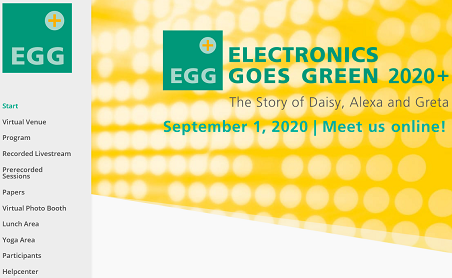Electronics Goes Green 2020+ brings together participants from the "green electronics sector" online

Despite the continuing corona crisis, conferences and other events are increasingly taking place in Europe again. However, in order to ensure the safety of participants and to avoid the increased potential for infections at major events, more and more of these events are shifting to the digital space.
One successful example is "Electronics Goes Green 2020+", which took place for the sixth time but made its debut as an online event this year. It is the largest conference on the topic environment and electronics, providing information on the latest trends, developments and the many facets of the "green electronics" sector. It also offers a unique opportunity to bring together the different actors from research, development, politics and decision makers in one event.
In addition to live presentations on September 1 and many pre-recorded lectures, networking with other participants was also possible via video chats. Furthermore, short yoga sessions were offered where participants could relax.
The main focus on environmentally friendly product development, systems and business models in the electronics industry is also reflected in the top-class presentations, for example the keynote speeches by Apple or Philips.
Sarah Chandler from Apple explained Apple's roadmap for CO2 neutrality, which also affects its supply chain, to be achieved by 2030 and the change to a circular economy. Especially our limited resources and the necessity of the targeted closed loop recycling management is in Apple's focus. Apple summarizes the above initiatives under the three pillars: Climate, resources and "smarter chemistry".
 Eelco Smit, Philips, presented Philips' sustainability program, which is revised on a five-year basis and has a long tradition within the company. As a company with today's special focus on the healthcare sector, Philips is particularly concerned about the rising costs of healthcare and that ~ 50% of the global population still has limited access to healthcare services. In addition, Smit clearly stated the over-consumption of global resources and the need to reduce CO2 missions. On the part of investors as well as end-customers, the issue of sustainability and eco-design is becoming increasingly important, which Philips is addressing with a focus on health, responsible consumption and production, and actions regarding climate.
Eelco Smit, Philips, presented Philips' sustainability program, which is revised on a five-year basis and has a long tradition within the company. As a company with today's special focus on the healthcare sector, Philips is particularly concerned about the rising costs of healthcare and that ~ 50% of the global population still has limited access to healthcare services. In addition, Smit clearly stated the over-consumption of global resources and the need to reduce CO2 missions. On the part of investors as well as end-customers, the issue of sustainability and eco-design is becoming increasingly important, which Philips is addressing with a focus on health, responsible consumption and production, and actions regarding climate.
Other companies from the entire electronics value chain, including raw materials manufacturers, were represented with a large number of other presentations on topics such as "green technologies", recycling management and related social issues, "eco-products" and regulations.
One example is the presentation by Christian Battenberg, Clariant, who reported on current legislation and developments in the field of flame retardancy for electronics. He explained the new Exolit® OP Terra flame retardants from Clariant, which contain up to 100% carbon based on renewable raw materials. By furthermore using renewable energy sources in their production in Germany, they thus make an important contribution to the sustainability of components, e.g. in the E&E sector, in which they are used.
The event thus provides many important starting points and aspects of how a more sustainable electronics industry can make its contribution to keeping average global warming as low as possible.
First picture: Shutterstock; Second picture: By courtesy of "EGG 2020+".